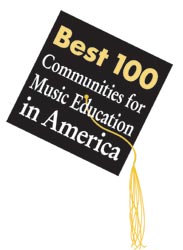100 Communities Named Best in America for Music Education
 |
The unveiling of the survey results coincides with “Music In Our Schools Month,” an observance that highlights this vital topic every March. In a 2003 nationwide Gallup Poll, 93 percent of Americans said that schools should offer musical instrument instruction as part of the regular curriculum. The mental and physical benefits of active music making have been well documented over the last decade. However, tight budgets in many of the 50 states have squeezed school music budgets, and music programs remain imperiled even in communities on the “Best 100” list.
“Inclusion in the list of the Best 100 Communities for Music Education should be seen as a high honor,” says Mike Bates, Director of Institutional Relations, Yamaha Corporation of America. “It reflects the fact that teachers, principals, superintendents, school board members and citizens of a community have decided to say ‘why not? Why not provide all of the children in our community with a classic education system rooted in the successes of the past while embracing the promise of the future?’ And, this education must include music and the arts.”
This year’s survey was conducted jointly by the country’s top organizations devoted to music and learning. Yamaha joined The American Music Conference (www.amc-music.org), MENC: The National Association for Music Education (www.menc.org), The Mr. Holland’s Opus Foundation (www.mhopus.org), The Music for All Foundation (www.music-for-all.org), The Music Teachers National Association (www.mtna.org), The National School Boards Association (www.nsba.org) and VH1 Save The Music Foundation (www.vh1savethemusic.com) in creating the survey and interpreting the results. Perseus Development Corp. of Braintree, MA (www.perseus.com) donated its time and expertise to implement the web survey and to analyze the data it generated.
Because the criteria in the survey are measured proportionally, large communities and small ones are able to participate on an equal footing – and the results bear out the conclusion that communities of varying sizes and levels of affluence have an equal chance of making the “Best 100” list. Where people value music and resolve that their children won’t be denied its benefits, parents and educators find a way to succeed.
“We all know about the pressures that are endangering music programs around the country,” says AMC Associate Executive Director Laura Johnson. “As we work to ensure that every child has a quality musical education, it’s important to shine the spotlight on those communities that have risen to the challenge so well. Theirs is an example worth following.”
A 2001 study published by The College Entrance Examination Board found that students in music appreciation scored 63 points higher on the verbal and 44 points higher on the math sections of the SAT than students with no arts participation. U.S. Department of Education data on more than 25,000 secondary school students indicates that students who report consistent high levels of involvement in instrumental music over the middle and high school years show “significantly higher levels of mathematics proficiency by grade 12.” And a Canadian study published in the August, 2004 issue of Psychological Science showed that young students who underwent nine weeks of piano or voice training showed increases in IQ that were greater than the increases in kids without musical activity. Similar studies continue to emerge.
Thousands of public school and independent teachers, school and district administrators, school board members, parents and community leaders, representing communities in all 50 states, participated in the Web-based survey during January, February and March. Participants in the survey answered detailed questions about funding, enrollment, student-teacher ratios, participation in music classes, instruction time, facilities, support for the music program, participation in private music lessons and other factors in their communities’ quality of music education. The responses were verified with district officials, and the sponsoring organizations reviewed the data.
For more information on Yamaha programs and products, write Yamaha Corporation of America, P.O. Box 6600, Buena Park, CA 90622; telephone (714) 522-9011; or e-mail infostation@yamaha.com.
 |
| © 2010 Yamaha Corporation of America. All rights reserved. |
